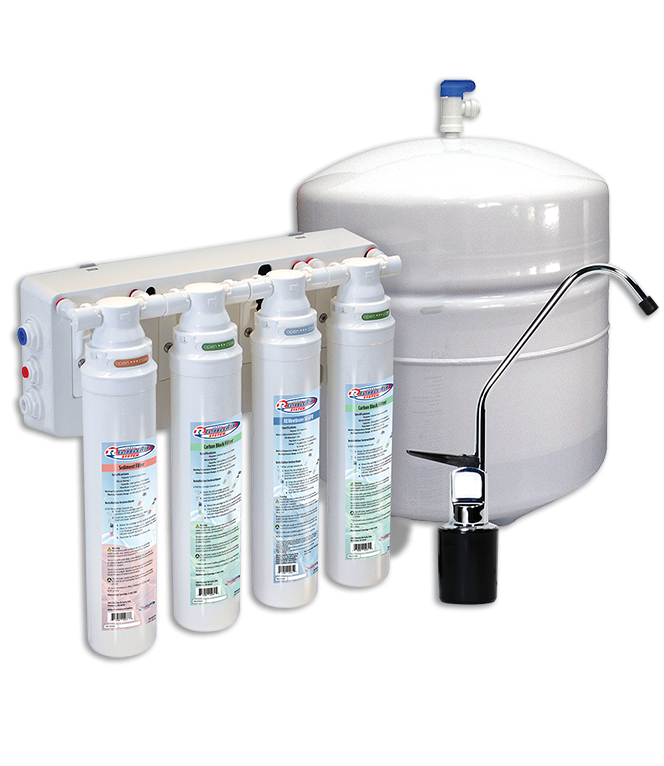If you're looking to make your home's tap water taste better and safer to drink, installing a reverse osmosis (RO) filter will remove common chemical contaminants and reduce certain protozoa, bacteria, and viruses in your water supply.
To help you decide whether a reverse osmosis filter is right for your home, we'll go over:
How reverse osmosis works
The benefits of a reverse osmosis water filter
The disadvantages of a reverse osmosis water system
The cost of a reverse osmosis system
Alternative water filtration options
Want safer, purer drinking water? Call Reliable Heating & Air at (770) 594-9969 or schedule an appointment .
Our plumbers will give you a free in-home water analysis to see if a reverse osmosis system is right for your home or if another type of filtration system will be better. We'll explain your options and do our best to give you cleaner, clearer drinking water.

How Reverse Osmosis Works
Reverse osmosis is a purification process that reverses the natural process of osmosis to remove foreign molecules and particles from drinking water.
Reverse osmosis systems use a 4-step filtration process to remove common contaminants found in Atlanta tap water:
Sediment filter: Basic filter that screens out sediments and particulates as small as 5 microns (14x smaller than the diameter of average human hair).
Carbon filter: Pre-filter that removes a wide range of contaminants that make water taste and smell better and safer to drink.
Reverse osmosis filters: Membrane that removes the majority of contaminants and dissolved substances as small as .001 microns.
Polishing carbon filter: Removes many remaining substances to purify your water.
This advanced filtration has a lot of benefits over drinking water from the tap and using other filtration systems.
Benefits of Reverse Osmosis Water
With reverse osmosis systems, you'll get:
Purer, better-tasting water. According to the CDC, even the most basic reverse osmosis systems remove common contaminants like sodium, chloride, copper, chromium, and lead. They can also reduce arsenic, fluoride, radium, sulfate, calcium, magnesium, potassium, nitrate, and phosphorus.
Safer water for people with compromised immune systems. RO systems are also effective at removing protozoa like Cryptosporidium, a microscopic parasite found primarily in surface water sources (lakes, streams, rivers, etc.) that can enter the municipal water supply. Cryptosporidium can cause illness in healthy adults, but can cause serious illness and even death for people with compromised immune systems.
Reliable drinking water when municipal water is compromised. If the city ever has water contamination or you live in an area with unreliable tap water, an RO system will filter your drinking water for harmful contaminants. This prevents you from having to rely on bottled water for safe drinking water.
More affordable and greener than bottled water. With a reverse osmosis water system, you're not paying for the added costs of packaging and distribution like you do with bottled water. You're also not using disposable plastic bottles that contribute to the ongoing plastic problem.
More flavorful food and beverages. Certain chemicals in water (including zinc, chlorine, and hydrogen) can make it have a metallic flavor, which in turn impacts the flavor of your food. When these compounds are removed, your food that you use water to cook with and brewed drinks (coffee, tea, etc.) will taste better.
While RO water has a lot of benefits, the systems also have a couple of disadvantages.
Disadvantages of Reverse Osmosis Water Filters
Reverse osmosis systems have a few drawbacks, including:
Removing healthy minerals. You unfortunately can't choose which contaminants and additives reverse osmosis filters remove, which means they also take out good minerals like calcium, fluoride, magnesium, and potassium.
Water waste. To properly filter water, reverse osmosis systems waste about 3 times as much water as they treat. This means added water usage, which is why we recommend using them only for water you drink and cook with and using alternative systems to filter your whole house.
Installation and maintenance costs. You can find affordable reverse osmosis systems, but even those will cost you several hundred dollars to install. You'll also have the added maintenance costs of replacing the carbon filters every 6-12 months and other filters every few years.

Cost of a Reverse Osmosis Water System
Reverse osmosis systems cost anywhere from $200 to over $7,500, depending on whether you go with:
A whole-house or point-of-use reverse osmosis system. Whole-house systems are installed at your home's water supply to filter water for your entire house, and can cost between $750 and $7,500. Point-of-use systems are installed beneath your kitchen sink and only filter water for that fixture, and cost between $200 and $1,500. Whole-house systems also use significantly more water (increasing your water bill) since they're filtering for your entire home.
A tank or tankless RO system. Tank RO systems store filtered water in a tank. Tankless reverse osmosis systems are more convenient because you don't have to wait for the tank to fill—essentially giving you an endless supply of fresh, pure drinking water—but tankless reverse osmosis systems will cost you several hundred dollars more.
Basic or advanced RO filtration. Reverse osmosis systems with advanced filtration are more reliable and remove more contaminants from your drinking water, but can also cost several hundred dollars more to install. The filters for advanced models also cost more to replace.
If you're not sold on an RO system, you have other options for cleaner, better-tasting water throughout your home.Alternative Water Filtration Options
You can also get filtered water from:
Filters built into your refrigerator. Although refrigerator water filters don't remove as many contaminants as a reverse osmosis system, your water still runs through an activated carbon filter, which is the most effective type of water filter for removing common tap water contaminants.
Whole-home water filters. You can install a whole-home water filter, attached to your home's main water supply, that removes some common contaminants from your drinking water (chlorine, lead, iron, etc.). Whole-house filters also help extend the life of your water-based appliances by removing minerals that cause buildup.
We understand if the upfront cost of installing an RO system is holding you back. That's why we offer reverse osmosis systems for a monthly fee so you don't have to pay the upfront installation cost. For $29.99 a month, you'll get a reverse osmosis system which includes:
Installation
All maintenance
Free filters that are conveniently shipped to your door
Want Cleaner Water With Reverse Osmosis? Call Reliable Heating & Air.
Call us today at (770) 594-9969 or schedule an appointment for a free in-home water analysis.
Our plumbing experts have been offering the most reliable plumbing service in the greater Atlanta area for more than 40 years. We'll explain the benefits of reverse osmosis systems and offer the best water filtration options to give your home healthier, better-tasting water.

